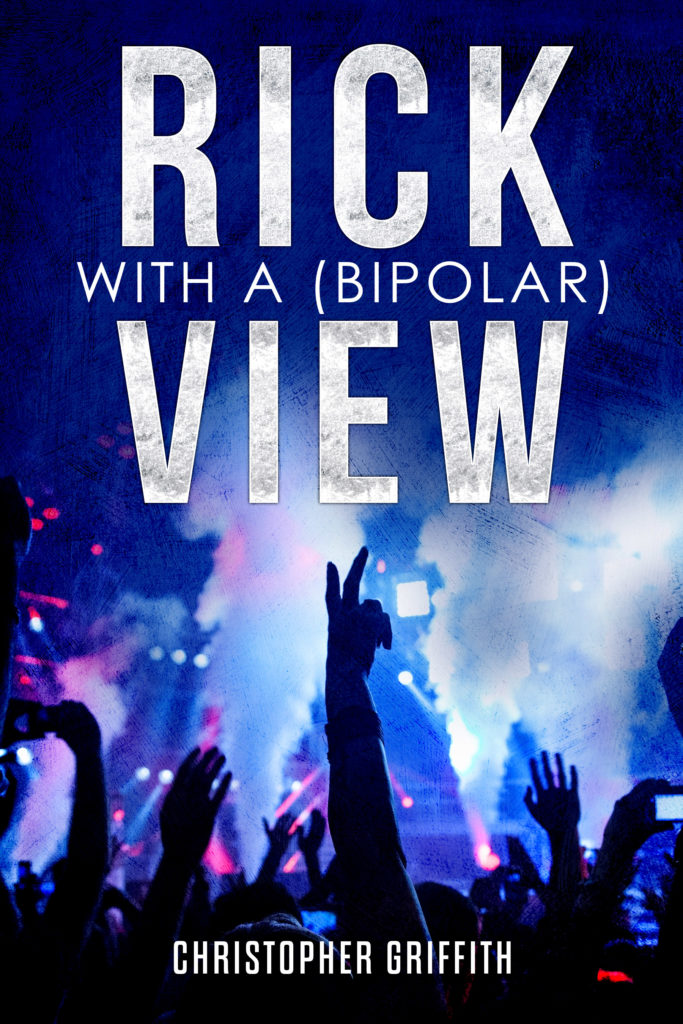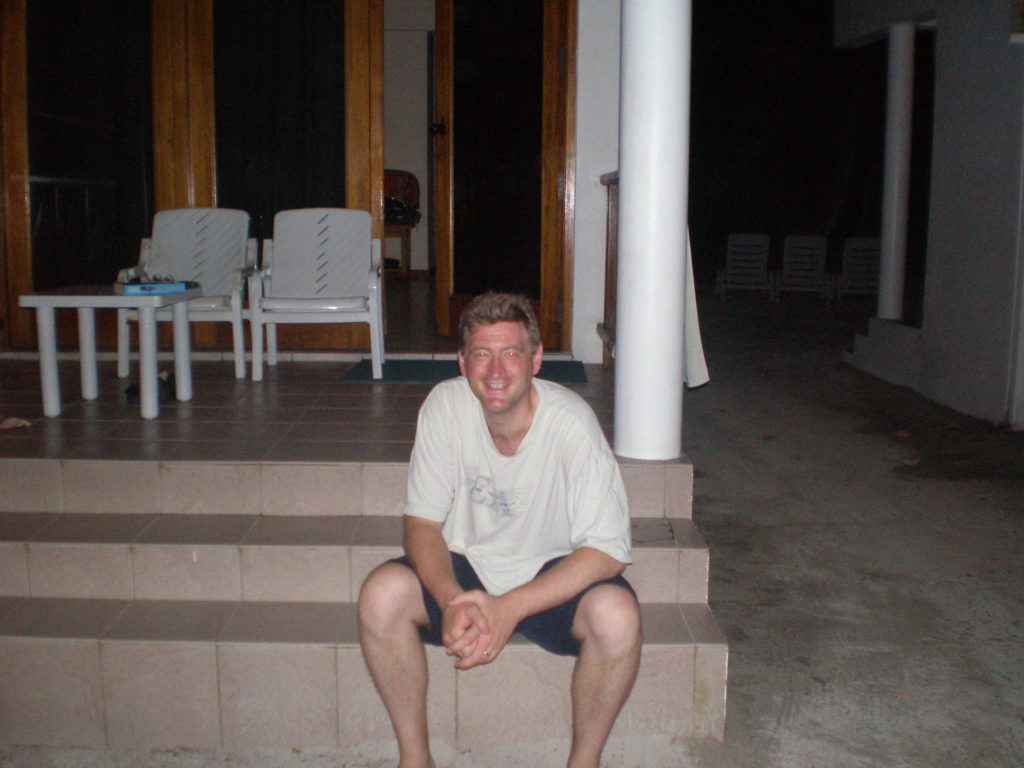The five main characters, Rick, Jenny, Lucy, Jimmy and Paul seemed to be ready made to feed off one another – when character drives plot, that’s when it’s easy to write.
Christopher Griffith – 1 February 2018
The Back Flap
Rick is wracked by the ravages of mental illness. Bipolar disorder, to be exact, although being just a twentysomething he still has enough optimism to see himself through the vagaries of depression and anxiety. His friendships help him, and his love for Lucy, and then there’s his passion for electronic music: Rick doesn’t want a job behind some desk, he wants to be a superstar DJ.
In this coming of age novel, we follow Rick through a week of his life, a week in which he must as ever work through and with his mental illness, treading the tightrope between sanity and bipolar disorder, stability and depression, peace and anxiety, and all whilst he’s dealing with the fluctuating love of friendships for his mates, his sister and his girlfriend.
As the climax of the week approaches, two paths lie open for Rick – an interview on Thursday with the possibility of seeing his twentysomething years morph into mundane, calamitous thirties, or a DJ gig on Friday when electronic music could win the day and see his coming of age crowned by a possible cure for his mental illness, the melody of the music overcoming bipolar disorder, depression and anxiety alike.
About the book
What is the book about?
It’s about a young man called Rick who suffers from bipolar depression, but who is determined not to let it get on top of him; along with his sister, his girlfriend and his two best mates he spends a week building up to his debut DJ gig in a local electronic music club
When did you start writing the book?
I began it in 1999 when I was 23 years old
How long did it take you to write it?
Just three months – it’s stream-of-consciousness so the prose does tend to flow from the pen on to the page
Where did you get the idea from?
The Catcher in the Rye by J.D. Salinger – I absolutely loved the book and wanted to write something similar, giving airtime to the voice of disaffected youth
Were there any parts of the book where you struggled?
It was really difficult writing about Rick’s relapse mid-week in the book; I’d only been diagnosed myself with bipolar a year before, and the emotions involved were still raw
What came easily?
The five main characters, Rick, Jenny, Lucy, Jimmy and Paul seemed to be ready made to feed off one another – when character drives plot, that’s when it’s easy to write.
Are your characters entirely fictitious or have you borrowed from real world people you know?
I never base any character wholly on a real world person; I tend to meld the personalities of several different people I know to create a new one. I don’t think it’s fair to pick up a real person and put them straight into a fictional setting, it’s invasive and it doesn’t work anyway as our judgements about one another are generally pretty flawed; to then transfer them into make believe means we’re already two steps removed from representing reality
We all know how important it is for writers to read. Are there any particular authors that have influenced how you write and, if so, how have they influenced you?
Forgive me for plugging my other novels here!
Each book I write is really the end result of the particular reading I’ve been engaged with at the time – so Temples of a Fantasy Revenge came about from prolonged encounters with, yes, fantasy novels; in particular, Tolkien, Feist, Hobb, Brooks, Jordan, McKenna. It’s nowhere near as good as these of course, but the influence is still in the writing.
Shakespeare’s Secret Knowledge was the culmination of my studying not just the Renaissance playwrights but also the history of the period, particularly the Reformation; William Ottoway’s Utopia sprung from Shelley’s Frankenstein, Golding’s Lord of the Flies and Garland’s The Beach; Champagne Jealousy and Corin’s Chronicle are a little different as they are based more on an emotion, anger, in the former and an idea, rhythm, in the latter.
Sorry to be round the houses a bit on this one but I think it’s a very good question that’s been asked; my writing style hasn’t been influenced by other authors, but a bit like the way I develop characters I suppose, I take bits and pieces from each author I read and merge them together to create my own work.
Do you have a target reader?
Yes, for Rick with a (Bipolar) View it’s a young adult + audience who are dealing with issues such as friendship, love, sex, music and mental illness; of course, the older audience member wanting to understand these things a little more could well dip their toe in the water here too, as could a slightly younger reader who is beginning to be faced with life choices which may prove a rocky road to negotiate
About Writing
Do you have a writing process? If so can you please describe it?
I tend to be quite disciplined and am a great believer in breaking down the task into smaller chunks – if I’m aiming for a 90,000 word novel, I’ll start with the intention of writing 1,000 words per day for 90 days; of course, real life usually intervenes in which case I’ll drop the target to 750 or 500 words per day, and even then there’ll be days when I simply can’t find the time to compose. But it’s vitally important to keep momentum going, as I’m sure most writers will tell you; you have to stay disciplined to complete the job
Do you outline? If so, do you do so extensively or just chapter headings and a couple of sentences?
When I was training to write, we all had to plan out in advance the pieces we’d be composing – that method simply did not work for me. I always write the first word, sentence, paragraph and chapter straight out, then move on from there, planning ahead only so far as my mind’s eye can see. Writing a book is vital, alive, the project lives and breathes and too much planning simply fetters expression, whether that be character, plot or theme
Do you edit as you go or wait until you’ve finished?
I edit as I go; by the time I’ve finished, I’m finished emotionally. I do revise the whole piece once more though, when I have recovered!
Did you hire a professional editor?
I simply didn’t have the funds available to do this; I wish I had, but I do have a long ago qualification in proofreading and I have learnt how to format a novel
Do you listen to music while you write? If yes, what gets the fingers tapping?
Yes, electronic music. I usually put on an old BBC Radio 1 Essential Mix and get myself lost in that whilst I write; I have over the last few years made, in true Rick style, a few mixes myself which you can find at:
https://www.mixcloud.com/Nyktomorph/
About Publishing
Did you submit your work to Agents?
Yes, I started out by scouring the pages of the Writers’ & Artists’ Yearbook, and for several years submitted my work to agents
What made you decide to go Indie, whether self-publishing or with an indie publisher? Was it a particular event or a gradual process?
A gradual process definitely – along the way, and it has been around 20 years now, I have received good interest in my work, but I always found myself shrinking from committing to industry because I feared I would be asked to modify, change, alter or in some way hand over property of my work. I am the author, I know my characters, story and theme in each novel better than anyone, and in that regard I am zealously possessive of the pieces I have created. Indie publishing was the obvious step for me to take, and I just regret I didn’t initiate it many years ago.
Did you get your book cover professionally done or did you do it yourself?
I had it professionally done
Do you have a marketing plan for the book or are you just winging it?
It has to be word of mouth because I simply don’t have the funds to market Rick With a (Bipolar) View myself – some of the marketing packages are so phenomenally expensive I have no idea how any indie author can remotely meet their budget. But there are ways a poor writer can market themselves, such as this very generous complimentary interview I have been offered!
Any advice that you would like to give to other newbies considering becoming Indie authors?
Go for it, especially if the traditional routes of publishing haven’t worked for you.
About You
Where did you grow up?
In Surbiton, a suburb of London in Surrey
Where do you live now?
I still live in Surrey. I have lived elsewhere, but there’s no place like home
What would you like readers to know about you?
I have the best day job in the world – I spent several years working in retail for a book shop but for the last decade I have been working as support staff to a sixth form in a local secondary school. During the day, I mix with intelligent, polite, infuriating, happy, sullen, excited, stressed students, and at night I become a writer
What are you working on now?
A sonnet sequence – keep your eye on my Amazon Author Page for its publication.
End of Interview:
Get your copy of Rick with A (Bipolar) View from Amazon US or Amazon UK.


